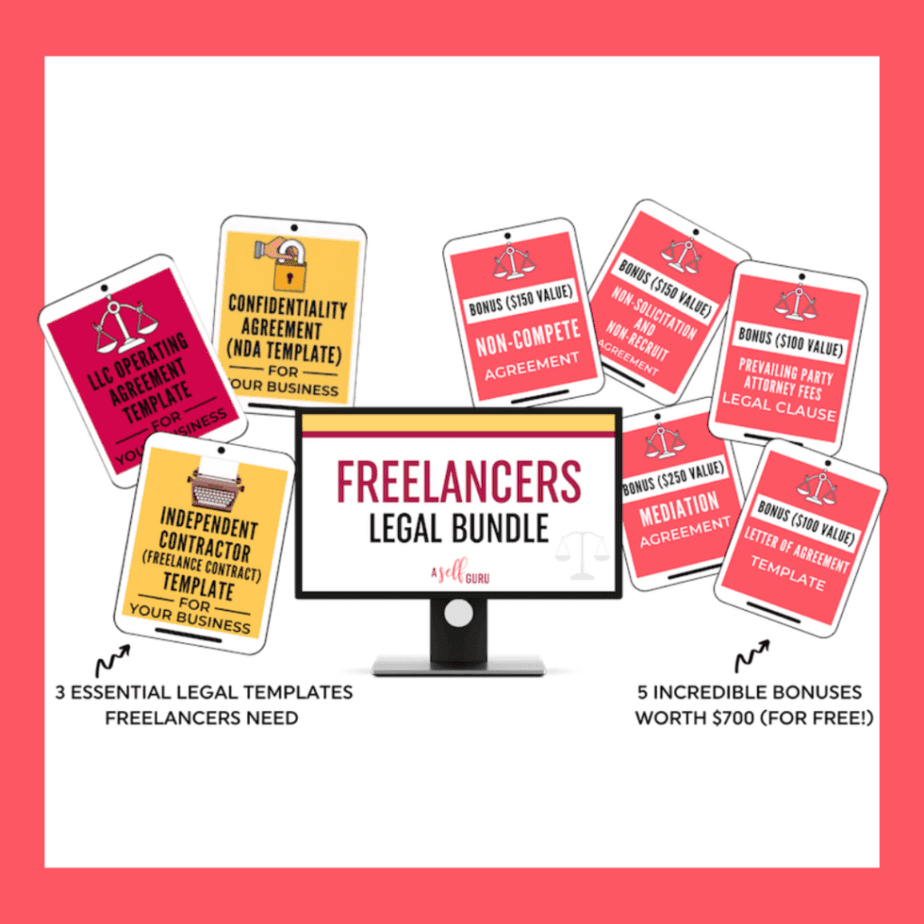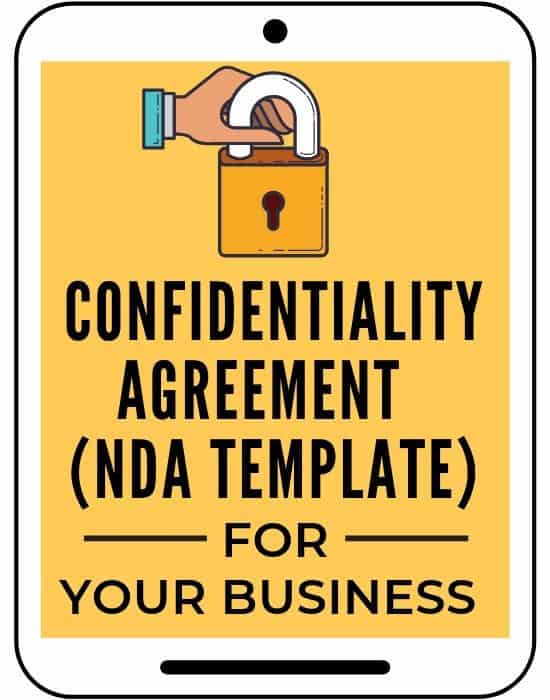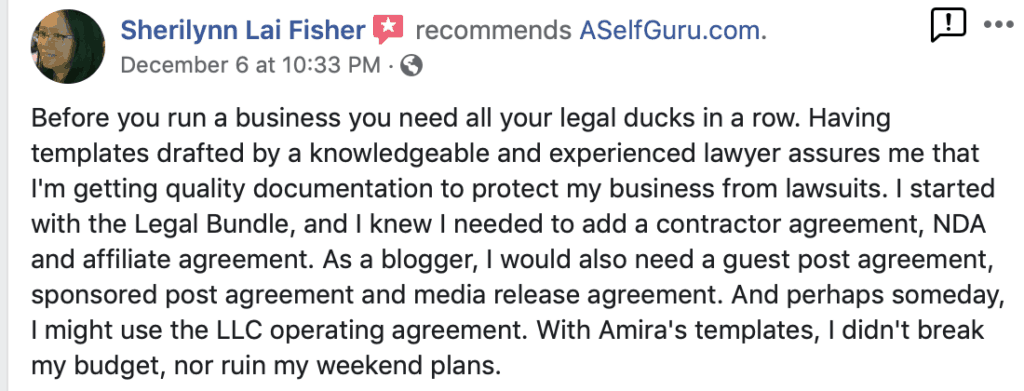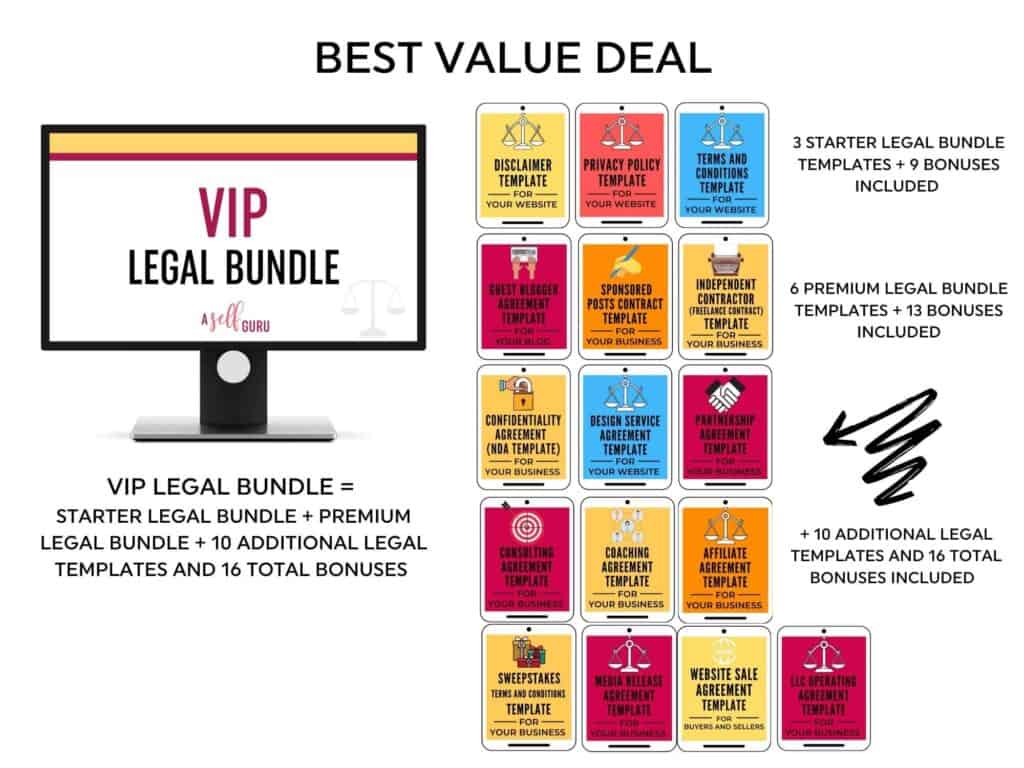As a business lawyer, I write contracts for a living so I’m often asked about the key contract clauses you should know.
When signing any legal contract, it’s essential to understand the fine print.
Contracts are legally binding documents that outline the rights, responsibilities, and obligations of each party.
Whether you’re hiring a freelancer for business, dealing with a residential lease, employment agreement, or a real estate contract, knowing these key contract terms will help protect you from potential pitfalls, misunderstandings, and legal action.
Let’s take a closer look at some of the most important contract clauses that you should be aware of when entering into a legally binding agreement.
Table of Contents
What are the Clauses in a Contract?
Clauses in a contract are sections or provisions that outline specific terms and conditions of the agreement.
These clauses define the rights, obligations, and responsibilities of each party involved.
They also help ensure that both parties are aware of their rights and duties under the contract.
Clauses can cover a wide range of topics, from payment terms to dispute resolution methods.
They have a significant impact on the involved parties.
It is important for you to carefully review and negotiate these standard clauses.
This way, you can ensure they accurately reflect the intentions and protect the interests of all parties involved.
Regularly reviewing and updating these clauses can also help adapt them to changing circumstances or industry standards.
Top Contract Drafting Lawyer for Small Business Owners.
11 Types of Clauses in a Contract for Business Relationships (Key Contract Clauses)
When it comes to key contract clauses for business transactions, keep these specific terms and most common types of contract clauses in mind:
1. Termination Clause
The termination clause outlines how and under what conditions a contract can be ended by either party.
This clause is particularly important in long-term agreements.
It provides a clear path for exiting the contract if certain conditions are not met to avoid potential disputes.
For example, in a commercial real estate contract, the termination clause might specify that either party can end the agreement if the property is not maintained in a safe condition, or if rental payments are consistently late. It may also include penalties or fees for early termination.
Understanding the specifics of the termination clause ensures you are aware of your rights and obligations should you decide to end the agreement early or if the other party violates the terms.
Another example is in a freelance or independent contractor agreement, a termination clause is an important part of the contractual agreement and negotiation process to protect both parties.
It may outline specific grounds for termination, such as failure to meet deadlines or quality standards.
It also specifies the process for ending the agreement such as notice or completing outstanding payments.
2. Non-compete clause
In some cases, a termination clause may also include a non-compete clause.
This clause prevents one party from engaging in similar business activities for a certain period of time after the contract is terminated.
Overall, having a well-defined and clearly written termination clause is crucial in any contract to provide clarity and reduce the risk of potential legal disputes.
It is important to carefully review this section before signing any agreement and seek legal advice if necessary.
Need proper legal documents? Grab our most popular VIP legal bundle templates here.
3. Confidentiality Clause
Also known as a non-disclosure agreement (NDA), a confidentiality clause protects sensitive information from being shared with third parties.
For example, this clause is commonly found in business contracts and employment agreements to safeguard proprietary information, trade secrets, or any other confidential data shared between parties.
You will need a separate confidentiality agreement to protect your intellectual property rights in a business partnership or before entering into discussions with potential investors.
This clause should outline:
- what information is considered confidential information,
- the duration of the agreement,
- and any exceptions to the confidentiality obligations.
In commercial contracts and settings, a confidentiality clause may prevent you from disclosing certain aspects of a business transaction, client information, or proprietary practices.
It’s crucial to understand the scope and duration of this clause, as breaches of contract could result in costly legal consequences.
4. Dispute Resolution Clause
Disagreements or conflicts can arise in any contractual relationship.
The dispute resolution clause outlines how these disputes should be handled.
The clause typically specifies whether disputes will be resolved through:
- mediation,
- arbitration,
- or litigation,
- as well as the jurisdiction where the legal proceedings would take place.
Arbitration and mediation are common alternatives to litigation and can be faster and less expensive. But you need to include an arbitration clause as a contractual provision in order to resolve disputes that way.
Understanding the dispute resolution clause will help you know what steps to take if a disagreement arises and how it will impact your ability to resolve the issue efficiently.
Related Post: Top 30 Startup Legal Issues to Must Avoid
5. Force Majeure Clause
The force majeure clause, sometimes referred to as the “Act of God” clause, excuses one or both parties from fulfilling their contractual obligations due to unforeseen events beyond their control.
This may include natural disasters, war, or other catastrophic events (acts of God) that make performance impossible or impractical.
For example, this clause became especially relevant during the COVID-19 pandemic when many businesses were unable to operate due to government lockdowns.
Knowing whether a force majeure clause is included in your contract can provide you with a way to protect yourself if unforeseen circumstances prevent you from fulfilling your obligations.
6. Indemnity or Indemnification Clause
An indemnity clause transfers the risk of certain losses or damages from one party to another.
In a typical indemnity clause, one party agrees to compensate the other for any losses or damages that arise from their actions or negligence.
For example, if you’re entering a contract to lease commercial property, the indemnity clause may require the tenant to hold the landlord harmless for any damages caused by the tenant’s negligence or failure to maintain the property.
Understanding this clause is essential because it defines who will be responsible for legal fees, damages, and other costs if something goes wrong.
You should carefully review and negotiate the terms of this clause.
Also, ensure that all potential risks are accounted for and properly allocated between the contracting parties.
7. Assignment Clause
An assignment clause dictates whether one party can transfer their rights and obligations under the contract to another party.
This is particularly important in business agreements where ownership or control of a company may change over time.
In a commercial real estate lease contract, for instance, the assignment clause might allow or restrict the tenant from subleasing the property to another business without the landlord’s consent.
It’s important to read and understand this clause if you need to transfer your responsibilities, scope of work, or rights to another party during the term of the contract.
8. Payment Terms Clause
This clause outlines the details of payment, including when payments are due, payment methods, and what happens if payments are late or missed.
In contracts involving large sums of money, such as a business deal or a commercial lease, the payment terms clause will often include interest rates or penalties for late payments.
It’s critical to understand the payment terms in any contract to avoid financial penalties or breach of contract.
Make sure you know when payments are due and what penalties you might face if payments are late.
Obviously, this is one of the most important clauses but often overlooked.
It is important to carefully review and negotiate this clause to ensure payment terms are fair and reasonable for both parties.
For example, in a partnership agreement, the payment terms may include how profits will be distributed and when partners can expect to receive their share of earnings.
In an employment contract, the payment terms may outline salary or wage amounts, as well as any bonuses or commissions that may be earned.
When in doubt, you should seek help from a lawyer to write your contract that includes proper payment terms as well as penalty clauses.
Also, regular reviews of your legal documents with a lawyer are recommended to protect your business interests.
9. Limitation of Liability Clause
The limitation of liability clause caps the amount of compensation one party can recover from the other in the event of a breach or failure to perform.
This clause is designed to protect businesses from excessive legal claims and limits the financial exposure of each party.
For example, a service provider may include a limitation of liability clause in their contract to restrict the amount of damages a client can claim if the service is unsatisfactory.
Knowing the limits of liability can help you assess the risks involved in the agreement.
10. Disclaimer
One of the most common clauses that often gets overlooked is a disclaimer.
A disclaimer clause is important because it limits the liability of a party for any damages that may result from the use of information or services provided under the contract.
For example, in a coaching agreement, you’d want to include a disclaimer stating that the results of the program are not guaranteed and that the client is responsible for their own actions and decisions.
This helps protect the coach from any legal action if the client does not achieve their desired outcome.
Another example is if you’re an online service provider, a disclaimer clause can protect you from legal action if there are errors in your service or if users misuse your platform.
Talking about disclaimers, make sure to post this AI disclaimer if you use AI tools.
Do you have a proper privacy policy posted on your website to ensure compliance with data protection laws?
Grab our legal bundle here to get a proper disclaimer or any other type of contract template for your business.
Related Video: Avoid these costly legal mistakes
11. Governing Law (Jurisdiction Clause)
The governing law or jurisdiction clause specifies which court of law or legal system will have authority over disputes that arise under the contract.
This is particularly important in international or multi-state contracts, where the laws governing the agreement may vary.
If your business operates in multiple locations or engages with international partners, the jurisdiction clause determines which country or state’s laws will apply if there is a disagreement.
It’s essential to ensure that the jurisdiction chosen is convenient and favorable to your business.
When entering into any contract, especially one as significant as a commercial lease contract, it’s crucial to carefully review all clauses including this choice of law provision to ensure you understand your rights and obligations.
What is an example of a common clause?
We discussed several particular clauses above.
These are all common legal clauses but governing law provision is a common legal clause.
This clause determines which state or country’s laws will govern the contract and any disputes that may arise.
This is important because different jurisdictions may have varying laws and regulations.
So it is essential to specify which laws will apply to avoid conflicts or confusion in case of a dispute.
Each contract may have additional clauses depending on its purpose, specific needs, and parties involved.
Final Thoughts on Key Contract Clauses
Contracts can be long and filled with legal jargon.
But paying close attention to key clauses like termination, confidentiality, dispute resolution, and payment terms will help you avoid common mistakes and make informed decisions.
If you’re ever unsure about a specific clause or how it may affect you, consulting with a lawyer is always a smart move to make sure to have essential elements.
This way, you can sign with confidence, knowing that you’re fully protected and aware of the terms you’re agreeing to.
Never underestimate the importance of thorough contract review and negotiation.
It could save you from potential disputes or financial losses in the future.
Also here are 11 key steps to manage financial distress in business.
RELATED POSTS TO KEY CLAUSES IN A CONTRACT
In addition to learning about key contract clauses, you should join my Facebook group here to connect with me and other entrepreneurs.
This blog offers many legal tips for entrepreneurs here.
Check out more helpful blog posts next:
15 Documents Needed to Sell a Business
Lawyer’s Guide to ADA Website Compliance (WCAG Checklist)
Blog Disclosures and Disclaimers: Examples and Template You Need
11 Essential Website Legal Pages You Need (+ Templates)
Lawyer’s Guide on AI Disclaimer for Website (+Template)
Creating a Website From Scratch: 13 Essential Steps
13 Best Contracts for Creatives
23 Legal Tips for Small Business from a Lawyer
16 DIY Legal Templates Entrepreneurs Need
VISIT THIS FREEBIES PAGE TO GET 5 AWESOME FREE BUSINESS, BLOGGING, AND LEGAL TIPS!
Below are some more helpful blog posts, legal tips, tools, and resources that you should check out next:
- Beautiful Pinterest templates to increase traffic to your blog!
- What’s an LLC and when to form one?
- How to Legally Protect Your Book (with Proper Copyright Notice and Disclaimer Examples)
- AI writing tool to write blog posts 10x faster, create social media content, videos, and any kind of content to save time in business
- This SEO tool makes sure your blog posts rank on the first page of Google!
- Manage your accounting effortlessly with this amazing tool.
- Is your website breaking this law? Prevent costly ADA lawsuits with this bundle.
MORE TOOLS TO GROW YOUR ONLINE BUSINESS
- TubeBuddy to grow your YouTube channel, and this is another great tool for YouTube SEO.
- Free SEO Masterclass to learn how to optimize your blog posts for SEO to rank on Google. You can also buy this awesome bundle of ebooks instead if you prefer ebooks over video training.
- Best accounting software to manage profit and loss and more!
- Best payroll service (super affordable too)
- A great all-in-one business platform for hosting your course, email communications, sales pages, and more!
- This paraphrasing tool to create original work for the client
- A professional theme for your website
- Millionaire blogger’s secrets here and tons of valuable resources.
- How to start your blogging business and make money online
- How to make money from affiliate marketing.
- The Best Freelance Writing Contract Template (for writers and clients)
- Guest Blogger Agreement to publish guest posts on your website legally and avoid any copyright infringement, Media release agreement to be able to use other people’s photos, videos, audio, and any other content legally, Privacy policy on your website to ensure your blog’s legal compliance, Disclaimer to limit your legal liability, Terms and Conditions to set your blog rules and regulations! Get all of these templates at a discounted rate in one of my best-selling VIP legal bundle here.






















